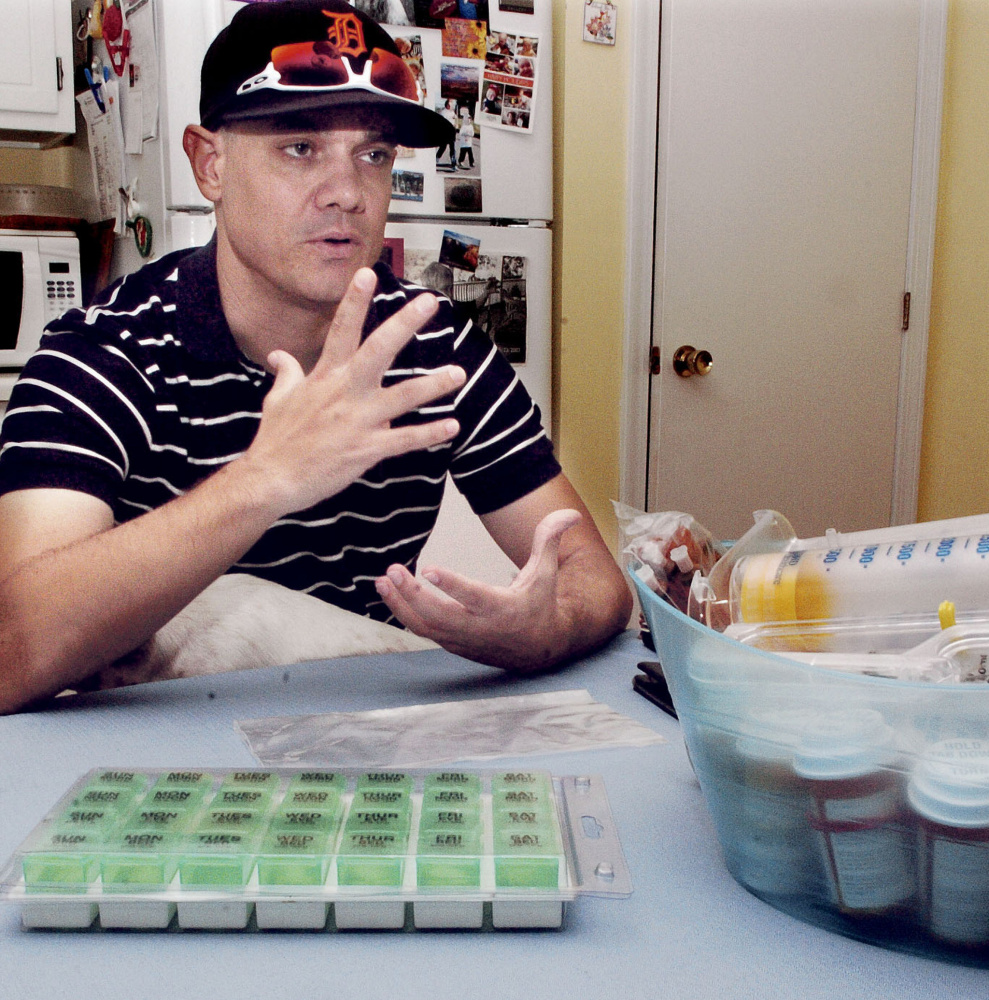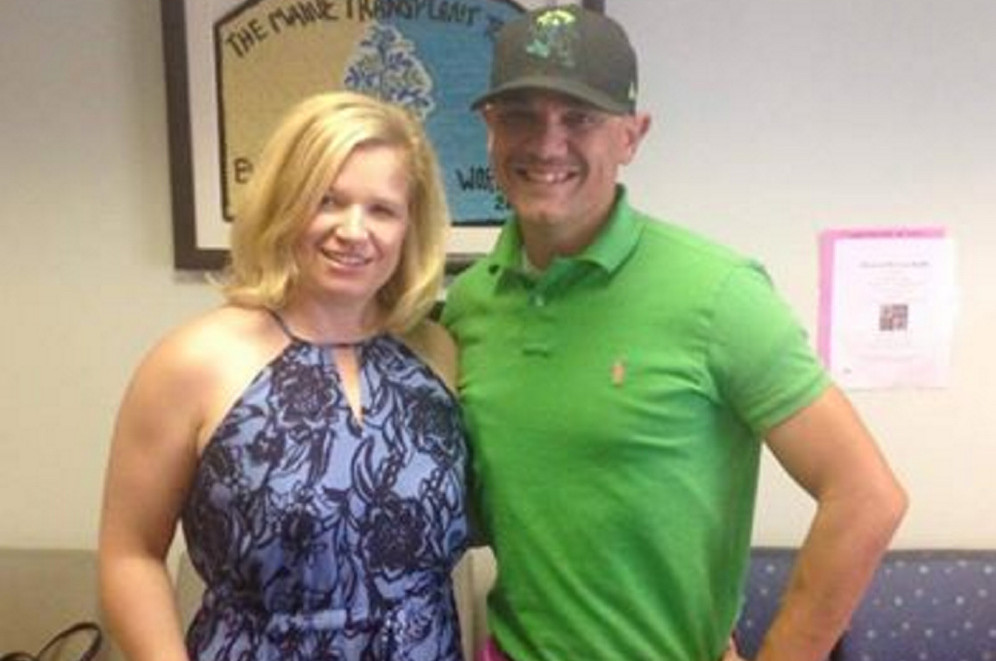Nine months ago, all Waterville native Michael Bowles wanted for Christmas was a kidney.
After being diagnosed with kidney failure the year before, Bowles, 38, moved to Arizona for a job and was hit with some disheartening news a week after uprooting his life: His kidneys had essentially lost all function, and he was now in stage five, or end-stage, renal failure.
By trade Bowles is a special education teacher. But in stage five kidney failure, dialysis was becoming his part-time job. Bowles would spend four hours a day three times a week getting the treatment that would serve the function of removing toxins from his bloodstream – what his kidneys were supposed to do.
Facing a five-year wait on the transplant list for a kidney from a deceased donor and an unsustainable way of life on dialysis, Bowles took to Facebook to put out one last plea for anyone willing to donate a kidney. The option of a family donation for Bowles wasn’t a possibility because of a family history of diabetes.
“It’s critical that a transplant be found, and I’m hopeful that maybe someone sees this and passes it along and maybe just (maybe) my Christmas wish will be filled. Thank you for taking a look,” Bowles wrote in the <URL destination=””>Dec. 11 post.
</URL>Bowles’ sister, Carrie Harvey of Waterville, who also took to social media, said in a call to the Morning Sentinel in December, “All he wants for Christmas is a kidney.” Harvey had set up a gofundme page to help with expenses called “My Brother Needs a Kidney.”
Meanwhile, in Saco, Davine Grantz had gone through the process of prepping herself to donate one of her kidneys to her brother. Instead, her brother’s wife donated a kidney.
Grantz’s nephew was a baseball player whom Bowles had coached when he was teaching in Maine. He saw Bowles’ Dec.11 post and passed it along to Grantz.
She knew she was meant to donate her kidney, so after taking a couple of days to think about it, she contacted Bowles on Facebook and the ball began to roll.
“I just figured in my head, what would have happened if one of my family members couldn’t have donated to my brother. Could a stranger have?” Grantz said. “I’m not a religious person, but I felt like I was called to do this.”
On Aug. 9, after months of pretests and prep, Bowles received Grantz’s kidney when they both underwent surgery at Maine Medical Center in Portland.
Bowles received a second chance at life, and Grantz gave the ultimate gift she wanted to give.
Juan Palma, a surgeon at the Maine Transplant Program, said that social media has opened up a whole new frontier for people trying to find living organ donors.
“The living donation landscape has changed thanks to social media,” Palma said. “It’s very easy to reach out to hundreds of people at a time.”
However, he said there are still many obstacles to people becoming living organ donors, including the financial burden of having to miss up to eight weeks of work. Palma said there are groups trying to push legislation that would compensate organ donors for wages lost during recovery time.
But Grantz had the ability to donate an organ and she advocates for others to do so.
“I get emotional, because how else could you change someone’s life and literally give them life other than giving birth to someone?” she said. “I really hope that people will consider doing this just for these few weeks of time.”
SECOND CHANCE AT LIFE
Bowles and Grantz are both doing well three weeks into recovery. Bowles, who is recovering with family in Manchester, said the transplant has given him a second chance at life. He will have to stay in Maine until November before he can go back to his life in Arizona to make sure the new kidney is functioning properly.
Regardless of where he is, Bowles says he will advocate for kidney donations.
“I don’t want her to feel that ‘Why did I just give this guy a kidney and he’s not doing anything,’ ” Bowles said. “(Donation) is a life-changer, and it does save lives. It’s a tough process to go through to become a donor. But when you become a donor, you can see what your gift of life can give somebody.”
Renal failure, commonly known as kidney failure, affects 26 million Americans, according to the National Kidney Center. Kidney failure occurs when the organ’s function of removing waste and extra water from the bloodstream and transferring them into the urinary system begins to decline, causing toxins to build up in a person’s blood supply and damage the body.
There are two options for people with kidney failure to find a new kidney: be placed on the waiting list for a new kidney from a deceased donor or find a living donor who is willing to donate one of their kidneys and is a match.
Palma said the waiting list for a deceased donor’s kidney “keeps ballooning by the day.”
On the national list for organ donation, 120,000 individuals are waiting for organs with 105,000 of those are waiting for a kidney, Palma said.
Annually, 5,000 people die while waiting for a kidney transplant, he said.
While it is more likely for a transplant to come from a deceased donor, Palma said the option of getting a transplant from a living donor often has a better outcome in terms of wait time and for the health of the kidney itself.
“Living donors’ kidneys last longer and you can find a better match,” Palma said. “When you have a living donor, it’s between you and your donor when you want the surgery to happen.”
But Palma said a big thing that deters people from donating a kidney is the level of education they have regarding transplants.
Grantz, a nurse liaison for a home hospice company, has spent her career caring for people. “It’s always been in the back of my mind that you help someone. It’s what you do,” Grantz said.
PERFECT MATCH, PERFECT STRANGER
When Grantz contacted Bowles on Facebook, she said he probably thought she was pulling his leg. But she saw what her brother went through as his kidneys were failing, and she knew the impact she could have on Bowles’ life.
In the following months, they would each undergo the series of tests, keep the appointments and fill out forms that are necessary when undergoing a transplant.
In a situation when your health and well-being is on the line, Bowles said with time and silence comes worry.
“I think that’s the worst part of the whole thing, just the wait,” Bowles said. “Every time they would call, I would be like, ‘Ugh, what’s wrong now?’ ”
But they would find out that they were actually a perfect match for donation, better than if Bowles was getting a kidney from a blood relative.
“Lo and behold the kidney was a perfect match. It was better than getting it from a sibling, the match was that good. The doctors were just dumbfounded how that happened,” Bowles said.
Bowles’ surgery took 6½ hours, a little longer than a usual kidney transplant because some of his veins were unusually small. When Grantz woke up after her surgery, she said that for a split second, when the pain set in, she questioned what she had gotten herself into.
But when the doctors told her that her kidney had taken to Bowles so well, that as soon as the surgeons began implanting it he began to urinate, the scope of her gift came back into focus.
“As soon as they told me that, I was like, this is why I did this,” Grantz said. “Just knowing that he’s never going to have to be on dialysis again.”
Grantz and Bowles talk every day, discussing how their recovery is going. Both have taken a leave of absence from work, Grantz for six weeks, Bowles for a few months. He’ll return to his teaching and coaching job in Arizona when the doctors clear him, hopefully by November.
He says he’ll be going back with a new kidney, a new outlook on life and with a new family member.
“She’s kind of become a part of my family,” he said, “and I’ve kind of become a part of her family.”
Send questions/comments to the editors.



